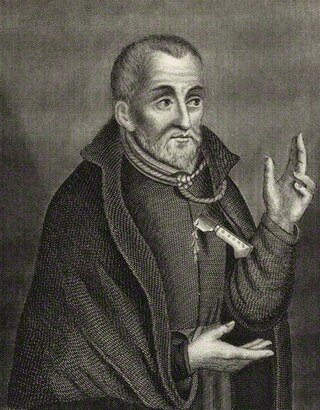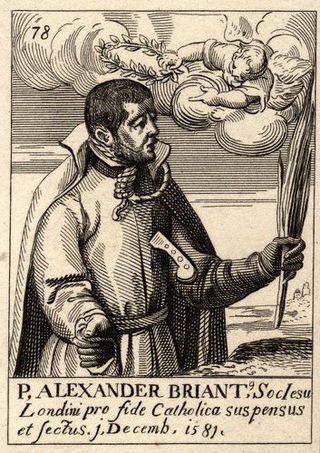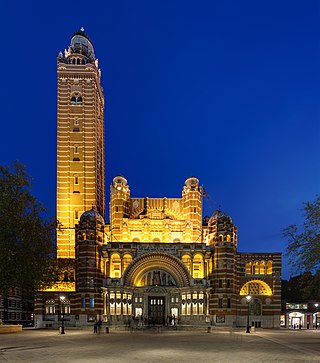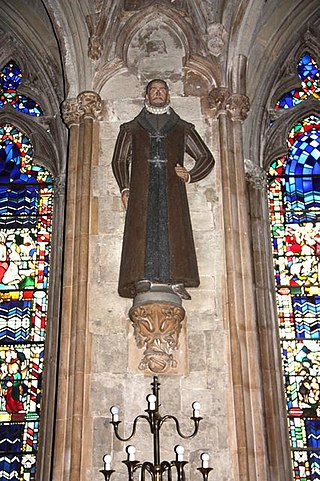Related Research Articles

Edmund Campion, SJ was an English Jesuit priest and martyr. While conducting an underground ministry in officially Anglican England, Campion was arrested by priest hunters. Convicted of high treason, he was hanged, drawn and quartered at Tyburn. Campion was beatified by Pope Leo XIII in 1886 and canonised in 1970 by Pope Paul VI as one of the Forty Martyrs of England and Wales. His feast day is celebrated on 1 December.

Robert Southwell, also Saint Robert Southwell, was an English Roman Catholic priest of the Jesuit Order. He was also a poet, hymnodist, and clandestine missionary in Elizabethan England.

Henry Constable was an English poet, known particularly for Diana, one of the first English sonnet sequences. In 1591 he converted to Catholicism, and lived in exile on the continent for some years. He returned to England at the accession of King James, but was soon a prisoner in the Tower and in the Fleet. He died an exile at Liège in 1613.

Henry Walpole was an English Jesuit martyr, executed at York for refusing to take the Oath of Supremacy.

Edmund Arrowsmith, SJ was one of the Forty Martyrs of England and Wales of the Catholic Church. The main source of information on Arrowsmith is a contemporary account written by an eyewitness and published a short time after his death. This document, conforming to the ancient style of the "Acts of martyrs" includes the story of the execution of another 17th-century recusant martyr, Richard Herst.
John Gerard was a priest of the Society of Jesus who operated a secret ministry of the illegal and underground Catholic Church in England during the Elizabethan era. He was born into the English nobility as the second son of Sir Thomas Gerard at Old Bryn Hall, near Ashton-in-Makerfield, Lancashire.

Alexander Briant was an English Jesuit and martyr, executed at Tyburn.

Thomas Garnet was a Jesuit priest who was executed in London. He is the protomartyr of Saint Omer and of Stonyhurst College. He was executed at Tyburn and is one of the Forty Martyrs of England and Wales.

John Jones, also known as John Buckley, John Griffith, Godfrey Maurice, or Griffith Jones was a Franciscan friar, Roman Catholic priest, and martyr. He was born at Clynnog Fawr, Caernarfonshire (Gwynedd), Wales, and was executed 12 July 1598 at Southwark, England. He is one of the Forty Martyrs of England and Wales.

John Payne (1532–1582) was an English Catholic priest and martyr, one of the Catholic Forty Martyrs of England and Wales.
The Douai Martyrs is a name applied by the Catholic Church to 158 Catholic priests trained in the English College at Douai, France, who were executed by the English state between 1577 and 1680.

The Catholic Church in the United Kingdom is part of the worldwide Catholic Church in communion with the Pope. While there is no ecclesiastical jurisdiction corresponding to the political union, this article refers to the Catholic Church's geographical representation in mainland Britain as well as Northern Ireland, ever since the establishment of the UK's predecessor Kingdom of Great Britain by the Union of the Crowns in 1707.
Christopher Bagshaw was an English academic and Roman Catholic priest.

Swithun Wells was an English Roman Catholic martyr who was executed during the reign of Elizabeth I. Wells was a country gentleman and one time schoolmaster whose family sheltered hunted priests. He himself often arranged passage from one safehouse to another. His home in Gray's Inn Lane was known to welcome recusants.

Henry Morse was one of the Catholic Forty Martyrs of England and Wales.

George Haydock was an English Roman Catholic priest. He is a Catholic martyr, beatified in 1987. He is not to be confused with his relative, also a priest, George Leo Haydock (1774–1849).
John Lockwood was an English Roman Catholic priest. He is a Catholic martyr, beatified in 1929.
Edmund Hartley, dubbed the Tyldesley witch, was a cunning man who from 1595 until 1596 was alleged to have practised witchcraft at Cleworth Hall in Tyldesley, Lancashire. Hartley was hanged, twice, after a trial at Lancaster Assizes in March 1597.
Edward Burden (c.1540–1588) was a sixteenth century recusant priest.
Alexander Crow was born in Yorkshire around 1550. He took up an early trade as a shoemaker, and hearing of an opportunity to follow his trade at the English College, then at Rheims, he travelled to France. He worked as a cobbler, porter, then under-cook at the seminary. Eventually he trained as a priest and was ordained in Laon in 1583.
References
- ↑ "Some Papers of Blessed Alexander Rawlins", The Venerable, Vol. III, No.3, Exeter, Catholic Records Press, October 1937
- ↑ Brownlow, Frank Walsh and Harsnett, Samuel. Shakespeare, Harsnett, and the Devils of Denham, University of Delaware Press, 1993, p. 362 n. 1 ISBN 9780874134360
- ↑ "Gennings, Edmund". Oxford Dictionary of National Biography (online ed.). Oxford University Press. doi:10.1093/ref:odnb/10516.(Subscription or UK public library membership required.)
- ↑ ""Henry Walpole S.J.", The Jesuits in Britain". Archived from the original on 21 August 2018. Retrieved 3 February 2019.
- ↑ Miola, Robert S., Early Modern Catholicism: An Anthology of Primary Sources, OUP Oxford, 2007, ISBN 9780199259854, p. 151